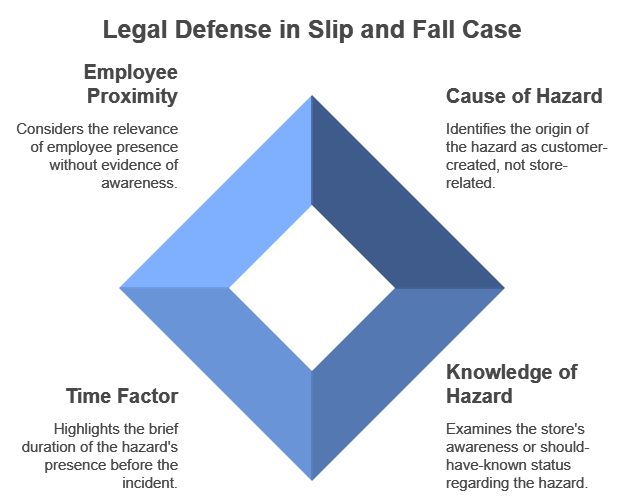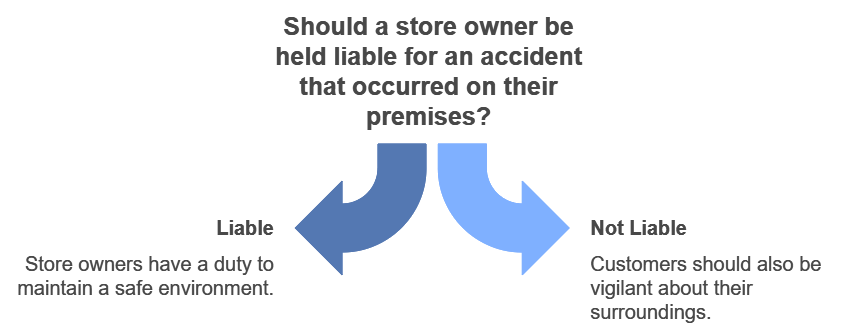When we visit a store, we expect it to be a safe environment. But what happens when an accident occurs? The recent case of Miguel Vasquez v. Home Depot U.S.A., Inc. sheds light on the complexities of premises liability and what it means for both shoppers and store owners. Let’s break down this case to understand what happened, why the court ruled the way it did, and what lessons we can draw from it.
Miguel Vasquez was shopping at a Home Depot store when he was injured. While in the checkout line, Vasquez left briefly to grab a drink from a nearby cooler. In his absence, another customer placed wire shelving on the floor in the checkout line. Upon returning, Vasquez tripped over the shelving, fell, and lost consciousness.
Believing that Home Depot was responsible for his injuries, Vasquez filed a lawsuit alleging negligence on the part of the store.
Understanding Premises Liability
Premises liability refers to a property owner’s legal responsibility for accidents and injuries that occur on their property due to unsafe conditions.
In Texas, to succeed in a premises liability claim, the injured party (plaintiff) must prove several elements:
- They were an invitee: Someone who has permission to be on the property for mutual benefit (like a customer in a store).
- The defendant owned or occupied the premises.
- There was a condition on the premises posing an unreasonable risk of harm.
- The defendant knew or should have known about the condition.
- The defendant failed to exercise reasonable care to reduce or eliminate the risk.
- The defendant’s failure was the proximate cause of the injury.
These elements set a high bar for plaintiffs to clear in order to hold property owners liable.
Home Depot’s Motion for Summary Judgment
Home Depot filed a motion for summary judgment, essentially asking the court to rule in their favor without a full trial. They argued that there was no genuine dispute over the key facts and that, even taking Vasquez’s account as true, they were not legally responsible for his injuries.
The Court’s Analysis
The court considered the following evidence:
Vasquez’s Deposition: He admitted that the shelving was placed on the floor by another customer, not a Home Depot employee. He also stated that he didn’t see the shelving when he left the line and didn’t know if any employees were aware of it.
Video Footage: Surveillance video showed that the shelving was on the floor for approximately 25 seconds before Vasquez tripped over it.
Key Factors in the Decision
- Cause of the Hazard: The dangerous condition (shelving on the floor) was created by another customer, not by Home Depot or its employees.
- Actual or Constructive Knowledge: There was no evidence that Home Depot knew about the shelving on the floor. Constructive knowledge means that the hazard existed long enough that the store should have known about it through reasonable care.
- Time Factor: The shelving was on the floor for only about 25 seconds before the accident. This short duration is critical because it didn’t provide sufficient time for employees to discover and address the hazard.
- Employee Proximity: While Vasquez mentioned that employees were nearby, mere proximity isn’t enough. There must be evidence that employees saw or should have seen the hazard.
Legal Precedents
The court referred to several Texas cases to support its decision:
- Wal-Mart Stores, Inc. v. Reece: Established that to prove constructive knowledge, the hazard must exist long enough to give the premises owner a reasonable opportunity to discover it.
- Wal-Mart Stores, Inc. v. Spates: Emphasized that a short duration of a hazard’s existence weakens the argument for constructive knowledge.
The Court’s Decision
Based on the evidence and legal standards, the court granted Home Depot’s motion for summary judgment. They concluded that:
- Home Depot did not create the hazard.
- There was no evidence that Home Depot knew or should have known about the hazard in the brief time it existed.
- Therefore, Home Depot did not breach its duty of care to Vasquez.
As a result, Vasquez’s claim could not proceed to trial, and Home Depot was not held liable for his injuries.
Implications and Lessons Learned
Accidents Aren’t Always Grounds for Liability: Just because an injury occurs on a store’s premises doesn’t automatically mean the store is liable. The legal standards for premises liability require proving knowledge and negligence. While stores have a duty to maintain a safe environment, customers should also be vigilant about their surroundings.
Legal Considerations
Time Matters: The duration a hazard exists is a key factor in premises liability cases. Short-lived hazards may not confer constructive knowledge.
Knowledge Is Key: Plaintiffs must provide evidence that the property owner knew or should have known about the dangerous condition.
Conclusion
The Vasquez v. Home Depot case illustrates the complexities of premises liability law. For shoppers, it’s a reminder that not all accidents lead to successful legal claims. Understanding the elements required to prove negligence can set realistic expectations.
For businesses, the case underscores the importance of maintaining safe premises and having effective protocols to address hazards promptly. While not all accidents can be prevented, demonstrating a commitment to customer safety can protect against liability.
If you’ve been injured on someone else’s property and believe negligence was involved, it’s essential to consult with a legal professional who can assess the specifics of your case.
This article is for informational purposes only and does not constitute legal advice. It is based on information available on casetext.com.



